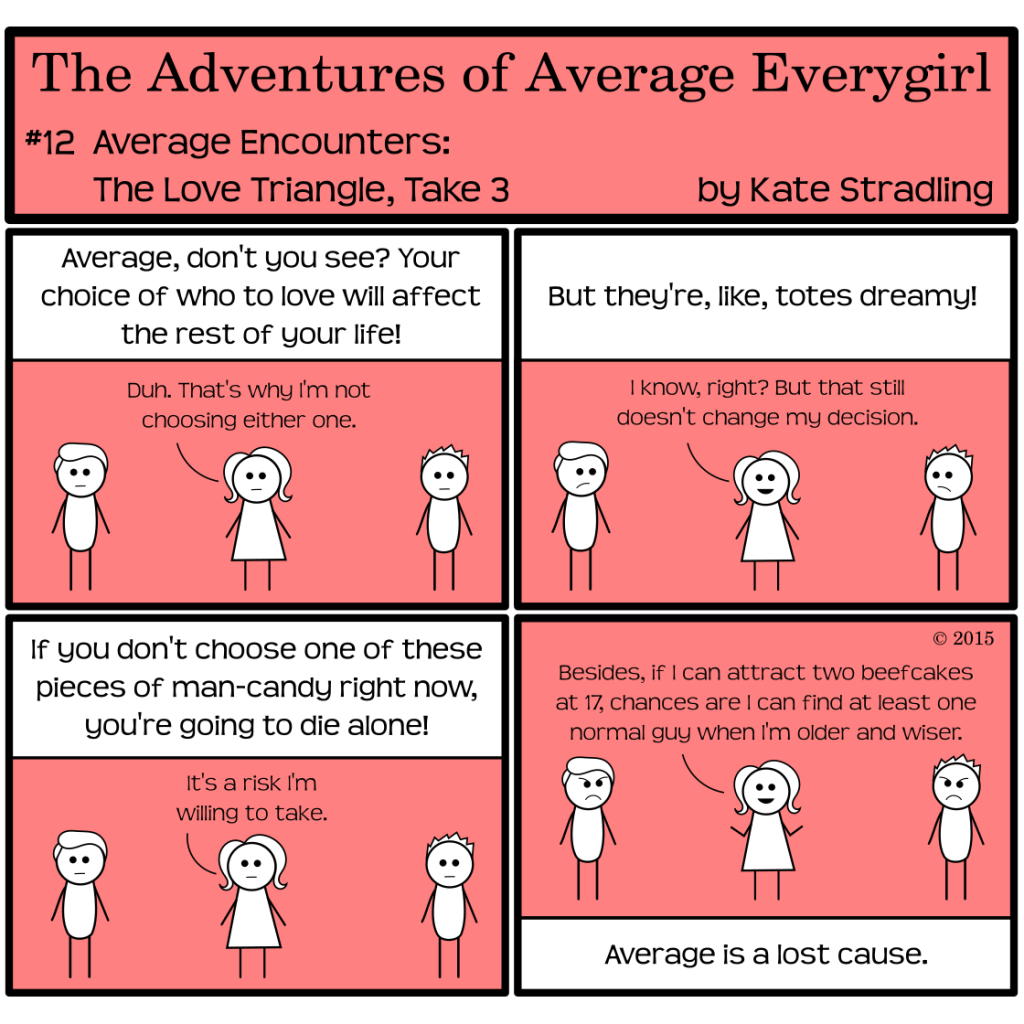
Alas. Logic brings a swift death to romance. Goodbye, unjustified Urgency of Choice!
Today’s installment pokes fun at what is, perhaps, my biggest beef with the Love Triangle scenario: when two obviously attractive Characters B and C fall for the same Character A who must then choose between them, it strips any sort of romantic tension from the story. Instead of a knuckle-biting, “Ooh, who will Character A choose?” I think, “What’s the big deal? With this track record, Characters D through Z must be lining up around the block.”
And I realize that I probably shouldn’t equate romance with a scarcity of lovers, but when there is no shortage of potential partners and they’re all equally attractive, there’s no real gamble, either. I mean, Character A ends up with someone regardless (which is typically the end goal for this type of story). Characters B and C might have their own (often canned) personality flavors, but they’re both framed as viable choices, and the story rarely continues on to show any dire consequences for Character A in the aftermath. As readers we’re left to assume that the final outcome was the best.
(And if we disagree, there’s always fanfic.)
Running against the clock
The urgency of the choice, too, gets on my nerves. “It’s now or nothing, Character A! You will never again meet anyone as perfect for you as these two magnificent specimens!”
A) Depressing.
B) Obviously Character A has some attraction that draws multiple love interests. Unless there’s a character overhaul in the near future (a traumatic brain injury that alters one’s personality, for example), chances are that attraction will still exist beyond the scope of the story.
Which brings to mind a question. If Character A (for Attractive) chooses B over C and they snuggle up together for their happily ever after, do Characters D through Z still show up wanting their turn in the aftermath? Does Character B get to look forward to an endless parade of rivals?
Choice as a hallowed ancient rite…?
There is literary precedence for this scenario. Helen of Troy chose Menelaus from her man-harem, married him, and then ran off with Paris when he finally waltzed into the picture. And we all know how well that ended. (Paris died in battle, Helen moved on to Deiphobus, Menelaus finally won the war and dragged her back home to Sparta. Yadda yadda yadda.)
But then, Helen was the most beautiful woman on earth. More specifically, she was the most beautiful trophy on earth. Girl-as-Object was alive and robust in former eras. Sadly, we keep it alive with this particular love triangle scenario (and its Guy-as-Object variation, naturally), even if our heroine is only mediocre in looks.
Which brings me to a comment a friend made, regarding my last blog entry:
“One of the famous philosophers stated that the primary relationship in a triangle is not the apex, but between the two angles of the base. The two Hot Guys going after the girl don’t have a relationship with her, they have a relationship with each other.” ~Jen, who is brilliant in a multitude of ways
Imma let that sink in.
They have a relationship with each other.
The exact wrong focus
A love triangle of this nature is not about the main character. It’s about the two rivals. If you pad them, dress them up in vibrant knee breeches, and assign them each a mascot, you can swap the girl out for an inflated piece of pigskin and have roughly the same pattern of action.
Back and forth, back and forth, here a touchdown, there a field goal. At the end of the book, the winning team gloats and the loser slinks off into oblivion. Or springs back renewed in a sequel, the rivalry more bitter than ever.
That’s right. We’re playing the literary equivalent of football. Suddenly all those #TeamWhoever tags make sense.
As does my apathy for Love Triangles.
(Sorry, not sorry.)
At least I know what I’m doing the next time I watch a football game. Now all I have to decide is whether I should call the ball Bella or Katniss. #TeamWhoeverWins
This exact thing is why I love the early Phantom of the Opera so much. The two blokes BOTH lose out on the girl in the end (with her choosing fame and singing and opera and stuff instead of either of them), which made me happy because:
1. Seriously, why should she give up even a minute of her singing and fame if that makes her happier than being with either man?
2. The guys were awesome, and their rivalry and eventual friendship was SO MUCH MORE ENJOYABLE than any romance could have been.
I had to look up what you meant by the “early” Phantom and discovered the 1943 film. I’ll have to see if I can find a copy; it sounds entertaining.
Thanks for the rec! 😀
Comments are closed.